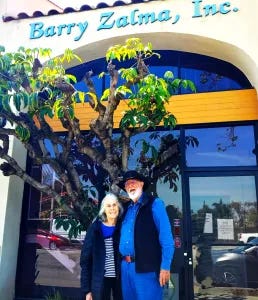Post 4863
Read the full article at https://lnkd.in/gRp7qaSV, see the full video at https://lnkd.in/gfRvh_z6 and at https://lnkd.in/gv53E37K and at https://zalma.com/blog plus more than 4850 posts.
Defendant Chiagoziem Kizito Okeke (“Okeke”) was charged with two counts: conspiracy to commit wire fraud and conspiracy to commit money laundering. He was convicted by a jury and moved the court for acquittal or a new trial in United States v. Chiagoziem Kizito Okeke, No. 4:21-CR-253(29), the United States District Court, E.D. Texas (August 21, 2024) ruled on the motion.
FACTS
The government charged Okeke participated in a multitude of fraudulent schemes to unlawfully obtain money from their victims, including online romance scams, business email compromise and investor fraud, healthcare and prescription fraud, and unemployment insurance fraud. Further it charged that Okeke, along with others, “did knowingly and willfully combine, conspire, confederate, and agree to commit wire fraud against the United States”. Additionally, the Second Superseding Indictment asserted that Okeke, along with others, not only coordinated how to receive money from victims, but also how to disguise, disburse, and launder that money once victims were defrauded.
Okeke orally moved for a judgment of acquittal after the United States rested. The Court denied Okeke’s oral motion. Following a thirteen-day jury trial, the jury returned its verdict and found Okeke guilty on both Count One and Count Two.
Motion for Acquittal
A Rule 29 motion for judgment of acquittal challenges the sufficiency of the evidence to convict. The issue is whether, viewing the evidence in the light most favorable to the verdict, a rational finder of fact could have found the essential elements of the offense charged beyond a reasonable doubt. The fact finder is free to choose among reasonable constructions of the evidence and it retains the sole authority to weigh any conflicting evidence and to evaluate the credibility of the witnesses.
Motion for New Trial
The court may vacate any judgment and grant a new trial if the interest of justice so requires. Generally, motions for new trial are disfavored and must be reviewed with great caution. A new trial is proper only where the defendant’s “substantial rights” have been harmed-either based on a single error or the cumulative effect of multiple errors.
ANALYSIS
Although the United States introduced several bank accounts belonging to Okeke at trial, he claimed that “no evidence [was] presented to the jury that any money from any victim entered his bank accounts.” Further, Okeke asserts that no text messages or WhatsApp chats “prove[d] beyond a reasonable doubt that he had an agreement with his brother or anyone else to commit wire fraud.” Additionally, Okeke contended that two witnesses (and co-defendants) for the United States, testified that Okeke did not commit any illegal activity. Finally, Okeke stated that he testified in his own defense, as a credible witness, that he did not agree (with anyone) “to commit the offense of wire fraud”.
The United States presented evidence regarding the discrepancy between Okeke’s total net bank deposits and income reported to the Internal Revenue Service. The Court found that the evidence presented was sufficient to support the guilty verdict. Okeke’s motion argued that the evidence presented does not establish beyond a reasonable doubt a scheme to defraud and a specific intent to defraud. Viewing the evidence in the light most favorable to the verdict, the Court determined that the jury could find Okeke guilty based on the evidence presented.
The United States claimed that a new trial was not appropriate for several reasons. The United States claims that it consistently and diligently provided discovery pursuant to its obligations.
The Court’s denial of Okeke’s motion for continuance does not warrant a new trial because Okeke has not shown that he experienced a specific and compelling or serious prejudice. A claim of prejudice to a party from the denial of a motion for continuance requires specific contentions of prejudice.
Although Okeke claims that he experienced “irreparable harm” from his inability to formulate a defense he has not identified any specific defensive measures he would have taken. Okeke has not offered specific contentions of prejudice from the Court’s denial of his motion for continuance.
It was therefore ORDERED that Defendant’s Motion for Acquittal and Motion for New Trial were denied.
ZALMA OPINION
Fraud perpetrators, by definition, have chutzpah (unmitigated gall) and cannot believe they were arrested, let alone taken to trial and verdict. The jury convicted him on all counts charged and, with the money obtained from his fraud, moved the court to set aside the verdict of the jury. Fraud hurting the elderly as well as insurers deserves a sentence that requires time in prison and restitution of the victims of his crimes.
(c) 2024 Barry Zalma & ClaimSchool, Inc.
Please tell your friends and colleagues about this blog and the videos and let them subscribe to the blog and the videos.
Subscribe to my substack at https://barryzalma.substack.com/subscribe or Subscribe to my substack at https://lnkd.in/gmmzUVBy
Go to X @bzalma; Go to Newsbreak.com https://www.newsbreak.com/@c/1653419?s=01; Go to Barry Zalma videos at Rumble.com at https://rumble.com/account/content?type=all; Go to Barry Zalma on YouTube- https://www.youtube.com/channel/UCysiZklEtxZsSF9DfC0Expg; Go to the Insurance Claims Library – https://lnkd.in/gwEYk; Go to the Insurance Claims Library – https://lnkd.in/gwEYk &videos at Rumble.com at https://lnkd.in/gRthzSnT


















Share this post